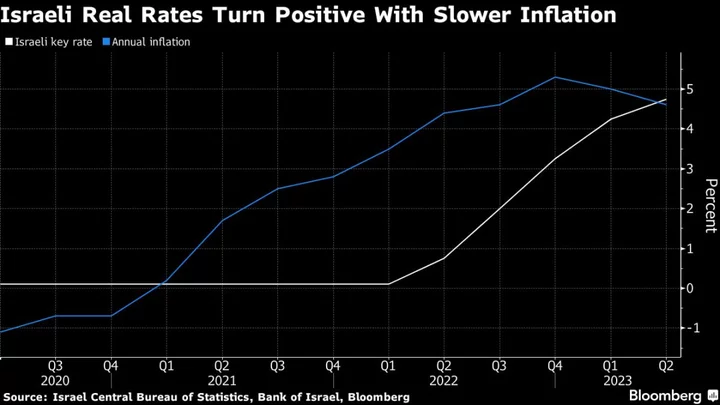Israel has the option of breaking with the Federal Reserve after closely tracking the US central bank during a record stretch of monetary tightening.
Though most economists still predict the Bank of Israel will follow its US counterpart by holding interest rates for the first time in over a year, Deutsche Bank AG calls the decision on Monday a “close call” after another bout of depreciation in the shekel.
Morgan Stanley is in a minority of three economists predicting an increase of as much as a quarter-percentage point. The rest in a Bloomberg survey of 15 analysts see no change in the benchmark from 4.75%.
Declines in the Israeli currency will likely be a swing factor after political uncertainty linked to the government’s proposed judicial overhaul already forced more tightening than the central bank first envisaged. The shekel is down about 1% since the central bank delivered an unprecedented 10th consecutive rate hike in late May, even as annual inflation slowed below 5% for the first time in eight months.
“The renewed FX weakness over the past couple weeks has put another 25 basis-point rate hike back on the table,” Deutsche Bank analysts including Christian Wietoska said in a report. “In our base-case scenario, with inflation having already peaked, we expect rates on hold at 4.75% until year-end.”
Official borrowing costs are now at their highest level since 2006, rising from near zero at the start of last year. While economic growth has cooled off, the labor market remains tight and inflation has been above the government’s 1% to 3% target range for over two years.
“A pause in hikes is now feasible, as the central bank keeps monitoring both inflation and the real economy,” says Ori Greenfeld, chief strategist at Psagot Investment House.
The decision this week might come down to the central bank’s assessment of risks around the shekel. Governor Amir Yaron has said the depreciation since January accounts for one percentage point of Israel’s inflation.
The shekel has complicated the calculus for the central bank since Prime Minister Benjamin Netanyahu’s far-right coalition initiated plans to reduce the power of the courts, triggering mass protests from opponents who fear an erosion of the country’s democracy.
Following a breather when the plan was suspended in March, the currency has come under pressure again after Netanyahu’s government introduced legislation aimed at removing another judicial power — using “reasonableness” as a basis for court decisions. Legislators are looking to pass that law by the end of the month.
With a loss of about 9% against the dollar, the shekel is among the worst performers since late January among the basket of expanded major currencies tracked by Bloomberg.
And as the Bank of Israel largely moves in sync with many of its global counterparts, the Fed’s pause last month may carry less sway after Chair Jerome Powell signaled policymakers could potentially raise rates in July and September.
Israel’s one-year currency swaps indicate investors see the base rate rising closer to 5% a year from now.
For Deutsche Bank, Israel’s “tightening cycle is over” unless the shekel depreciates to 3.8 per dollar. It weakened to 3.7230 versus the US currency as of 8:55 a.m. in Tel Aviv on Monday.
The Israeli currency could tilt the scales toward a rate hike if it trades above 3.7 per dollar, according to Jonathan Katz, macro strategist at Leader Capital Markets. The Bank of Israel considers it the main factor affecting inflation, he said.
“The next rate decision will be greatly influenced by the direction of the shekel,” Katz said.
--With assistance from Harumi Ichikura.
(Updates number of surveyed economists in third paragraph.)

